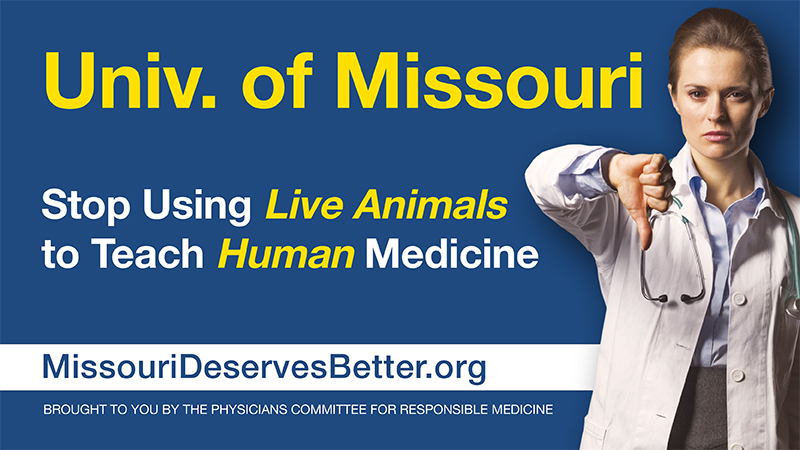Tell the University of Missouri: Stop Using Animals for Medical Training

At the University of Missouri School of Medicine (MU) in Columbia, emergency medicine residents are taught procedural skills using live animals.
Trainees are instructed to cut into the animal’s throat, chest, and abdominal cavity to insert needles and tubes, and to spread the ribs in order to access the heart and remove fluid from the sac surrounding the heart. According to the animal use protocol, the procedures continue even if the animal dies while on the operating table. If the animals survive the invasive procedures, they are killed before needle drainage of the pericardium is performed.
Today, 97 percent of emergency medicine residency programs (260 of 269) in the United States and Canada use only nonanimal methods, such as human-based medical simulators and cadavers. In fact, all other emergency medicine residencies in Missouri—including Washington University in St. Louis, the University of Missouri at Kansas City, St. Louis University School of Medicine, and Freeman Heath System in Joplin—exclusively use human-based training methods.
MU’s state-of-the-art facility—the Shelden Clinical Simulation Center—could provide the resources to replace the use of animals in the emergency medicine residency.
Take Action
Please take a minute to ask the University of Missouri School of Medicine interim dean Steven Zweig, MD, and emergency medicine residency program director Christopher Sampson, MD, to immediately replace the use of live pigs for training emergency medicine residents. We have provided text for you, but we encourage you to write your own message. Please be polite and encouraging.
Media Contact:
Reina Pohl, MPH
Communications Specialist
Physicians Committee for Responsible Medicine
202-527-7326
rpohl [at] pcrm.org (rpohl[at]pcrm[dot]org)
Campaign Contact:
Christine Kauffman
Manager of Medical Education Programs
Physicians Committee for Responsible Medicine
ckauffman [at] pcrm.org (ckauffman[at]pcrm[dot]org)







